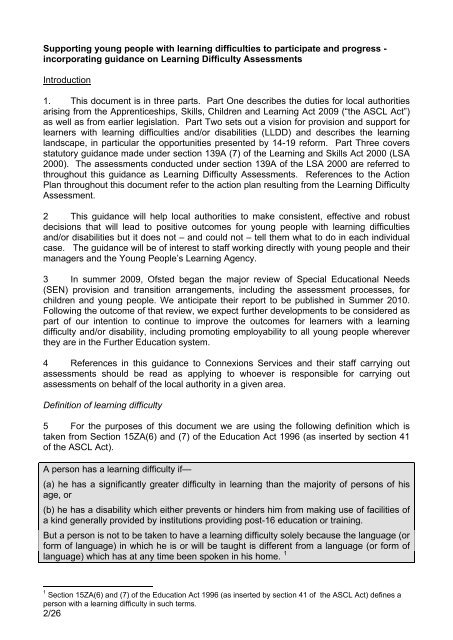Supporting young people with learning difficulties to participate and ...
Supporting young people with learning difficulties to participate and ...
Supporting young people with learning difficulties to participate and ...
You also want an ePaper? Increase the reach of your titles
YUMPU automatically turns print PDFs into web optimized ePapers that Google loves.
<strong>Supporting</strong> <strong>young</strong> <strong>people</strong> <strong>with</strong> <strong>learning</strong> <strong>difficulties</strong> <strong>to</strong> <strong>participate</strong> <strong>and</strong> progress -<br />
incorporating guidance on Learning Difficulty Assessments<br />
Introduction<br />
1. This document is in three parts. Part One describes the duties for local authorities<br />
arising from the Apprenticeships, Skills, Children <strong>and</strong> Learning Act 2009 (“the ASCL Act”)<br />
as well as from earlier legislation. Part Two sets out a vision for provision <strong>and</strong> support for<br />
learners <strong>with</strong> <strong>learning</strong> <strong>difficulties</strong> <strong>and</strong>/or disabilities (LLDD) <strong>and</strong> describes the <strong>learning</strong><br />
l<strong>and</strong>scape, in particular the opportunities presented by 14-19 reform. Part Three covers<br />
statu<strong>to</strong>ry guidance made under section 139A (7) of the Learning <strong>and</strong> Skills Act 2000 (LSA<br />
2000). The assessments conducted under section 139A of the LSA 2000 are referred <strong>to</strong><br />
throughout this guidance as Learning Difficulty Assessments. References <strong>to</strong> the Action<br />
Plan throughout this document refer <strong>to</strong> the action plan resulting from the Learning Difficulty<br />
Assessment.<br />
2 This guidance will help local authorities <strong>to</strong> make consistent, effective <strong>and</strong> robust<br />
decisions that will lead <strong>to</strong> positive outcomes for <strong>young</strong> <strong>people</strong> <strong>with</strong> <strong>learning</strong> <strong>difficulties</strong><br />
<strong>and</strong>/or disabilities but it does not – <strong>and</strong> could not – tell them what <strong>to</strong> do in each individual<br />
case. The guidance will be of interest <strong>to</strong> staff working directly <strong>with</strong> <strong>young</strong> <strong>people</strong> <strong>and</strong> their<br />
managers <strong>and</strong> the Young People’s Learning Agency.<br />
3 In summer 2009, Ofsted began the major review of Special Educational Needs<br />
(SEN) provision <strong>and</strong> transition arrangements, including the assessment processes, for<br />
children <strong>and</strong> <strong>young</strong> <strong>people</strong>. We anticipate their report <strong>to</strong> be published in Summer 2010.<br />
Following the outcome of that review, we expect further developments <strong>to</strong> be considered as<br />
part of our intention <strong>to</strong> continue <strong>to</strong> improve the outcomes for learners <strong>with</strong> a <strong>learning</strong><br />
difficulty <strong>and</strong>/or disability, including promoting employability <strong>to</strong> all <strong>young</strong> <strong>people</strong> wherever<br />
they are in the Further Education system.<br />
4 References in this guidance <strong>to</strong> Connexions Services <strong>and</strong> their staff carrying out<br />
assessments should be read as applying <strong>to</strong> whoever is responsible for carrying out<br />
assessments on behalf of the local authority in a given area.<br />
Definition of <strong>learning</strong> difficulty<br />
5 For the purposes of this document we are using the following definition which is<br />
taken from Section 15ZA(6) <strong>and</strong> (7) of the Education Act 1996 (as inserted by section 41<br />
of the ASCL Act).<br />
A person has a <strong>learning</strong> difficulty if—<br />
(a) he has a significantly greater difficulty in <strong>learning</strong> than the majority of persons of his<br />
age, or<br />
(b) he has a disability which either prevents or hinders him from making use of facilities of<br />
a kind generally provided by institutions providing post-16 education or training.<br />
But a person is not <strong>to</strong> be taken <strong>to</strong> have a <strong>learning</strong> difficulty solely because the language (or<br />
form of language) in which he is or will be taught is different from a language (or form of<br />
1<br />
language) which has at any time been spoken in his home.<br />
1 Section 15ZA(6) <strong>and</strong> (7) of the Education Act 1996 (as inserted by section 41 of the ASCL Act) defines a<br />
person <strong>with</strong> a <strong>learning</strong> difficulty in such terms.<br />
2/26
















